By Danish Reyaz
The heart-wrenching partition of the Indian subcontinent in 1947 no doubt created hatred and animosity between Hindus and Muslims, but it hit the Muslims, in particular, hard on many levels. They became rudderless in society as the intelligentsia and the wealthy class from the community migrated to the newly formed Pakistan. Those who were left behind were mostly poor. Living in the absence of any leadership and amidst an atmosphere of mistrust, they kept lagging further, both educationally and economically.
The Malda district in West Bengal faced a similar fate, with the Muslim population getting into the morass of poverty after partition. But the situation is, to some extent changing now. There are plenty of good Samaritans who are doing their utmost to change the fate of their community.
One such noble soul is Muhammed Azizur Rahman, who has risen to the occasion. Guided by the belief that there is no service better than education to remove poverty, he has embarked on a mission to ensure the best education for the children of the underprivileged.
He has founded the Tarbiyah Cambridge International School, popularly known as TCIS, in Baranagar (Danga), Jalalpur in Malda district, which has over 50% Muslim population but lacks educational institutions in proportion.
Tarbiyah Cambridge International School (TCIS) is an attempt to fill the void of modern education in the community in line with the vision of Azizur Rahman, which also puts much emphasis on religious teachings side by side.
“The present school is only the beginning. While it is set to expand to accommodate more students shortly, I have a broader vision to establish TCIS in every district of West Bengal and, if God’s willing, in neighbouring states,” says Mr. Rahman with quiet determination in his eyes.
Besides being a crusader for education, there is another dimension to his identity, and that is of a successful entrepreneur. Even before he forayed into the education field, he had cemented his position as one of the country’s leading players in the silk industry.
Starling Silk Mills Pvt. Ltd, a company he founded in Jalapur, Malda, is a major silk exporter worldwide. He has provided employment to 50 thousand households and cultivators and many more workers at the factory, improving their economic condition.
Azizur Rahman has turned messiah for people in the poverty-stricken Malda, as he employs local masses with his company while educating their children in hisTarbiyah Cambridge International School (TCIS) to shape the future of the fledgling new generation.
He also dons the hats of a philanthrope and a social worker. The multi-faceted Azizur Rahman has all the trappings of a true leader for social causes. Here, this cover story brings you an in-depth view of his world, works, and vision.
A Polite and Professional Man
To begin with, Azizur Rahman is a man of respect, and his mere presence is enough to evoke that respect, considering his tireless service to his people and society. His success in his endeavours exalts his position further.
But despite being successful and having an enviable societal reputation, he doesn’t throw any attitude. He often wears a soft smile on his otherwise quiet face. He is polite, respectful to others, and a bit restrained in his talking. Getting him to talk about his endeavours and achievements takes some time.
A man with average height and build, Azizur Rahman, spots a Balbo beard and loves to be dressed formally in public to preserve his image as a professional man. He says, “I don’t like cavalier attitude. For success, one should always be professional in work, words, conduct, or dress.”
His Parents, Education, and Early Life
Born to Abdul Jalil and Gulnahar on March 5, 1965, Azizur Rahman had a normal childhood. Although his father was a man of his time when education wasn’t a priority in the eyes of parents, he was committed to his children receiving education. Since Azizur Rahman was sharp-minded from a very early age, his father had another potent reason to get him educated.
Reminiscing his parents’ influence, Azizur Rahman says that they were simple human beings who, despite limited means, lived a life full of gratitude towards the Almighty, a virtuous trait he inherited from them.
He says, “My parents cared to bring me up into a better individual by providing good education, rightful guidance, constant support, and inspiration to work hard. Without them, I couldn’t have become what I am today.”
The love and respect Azizur Rahman have for his parents is evident from the fact that when he started a trust for his educational endeavour, he named it “A J Gulnahar Memorial Trust.”
Coming back to his education, Azizur Rahman did his primary education from MadarsaImdadul Uloom and matriculation from Mohammadia High Madarsah. He passed his intermediate from Malda Town High School with flying colours.
About his graduation he says, “I wanted to take my father’s silk business to the next level, so I chose Commerce and secured a degree from Kolkata University in 1986.”
As soon as Azizur Rahman finished his graduation, he joined his father’s business, but it was only a formal entry for him. In fact, he had started assisting his father at the age of 12.
A Background to Starling Silk Mills Pvt. Ltd.
As much as the Malda district is known for its delicious Malda mangoes, it is known for silk production. Silk production was introduced in Malda about 300 years ago by the king of Gaur.
With time, more households embraced it, cultivated cocoons, and produced silk so much that it became a hub for raw silk. However, it took the shape of an industry only later.
Azizur Rahman’s grandfather set out to produce silk in 1908 with a vision to organize the sector and provide employment to the local people. Later, Azizur Rahman’s father helmed it and expanded it further. He did his utmost with whatever resources and capital were available to him at that time.
But the business took a shape of factory only when Azizur Rahman took over. Azizur Rahman took a loan of 18 thousand from bank and invested it into the business along with a lot of sweat and hard work. He foundedBengal Silk Industries in 1983 and since then there has been no looking back.
Later the Bengal Silk Industries was rechristened as Starling Mills Pvt. Ltd. and registered in 1995.
About Starling Silk Mills Pvt. Ltd
Starling Silk Mills Pvt. Ltd. is an ISO 9001:2000 certified company which has carved its niche amidst cut-throat competition, emerging as India’s leading manufacturer and supplier of a wide range of silk and yarn products.
These products are made with hundred percent spun silk and derived from various cocoons such as Muga, Mulberry, Tussah, and Eri. The vast product line includes spun silk fabrics and sarees, silk shirts, silk textile materials, matka silk fabrics and natural silk quit. In terms of spun silk yarn, the company deals in Tassar silk, recycle silk, noil silk, moga silk, carpet silk and silk knitted yarn.
Azizur Rahman says, “Our flawless high-quality products cater to the needs of textile, clothing, interior, medical, and industrial sectors in the country and worldwide.”
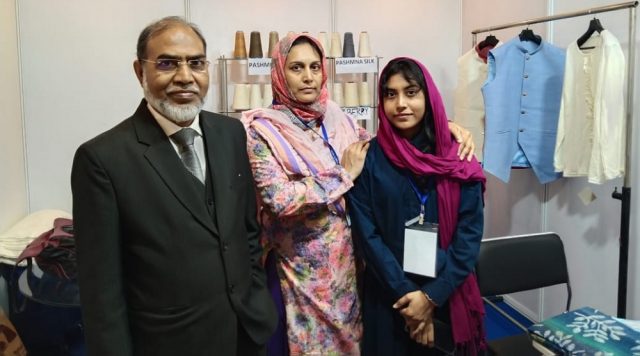
M Azizur Rahman with his family at BKC in Mumbai
Making Starling Silk Mills Pvt. Ltd. a Leading Company
The rise of Starling Silk Mills Pvt. Ltd has all to do withAzizur Rahman’s ceaseless efforts in giving a new dimension to his family business and his desire to go the extra mile to learn new things and implement them well before it is time.
Transforming a family silk business from a cottage unit into a thriving mill and one of India’s leading manufacturers and suppliers of silk products takes a lot of planning and far-sightedness besides hard work.
Azizur Rahman went about in his endeavour pretty meticulously. First, he took a round abroad, observed international mills in Italy and Germany, and imported various modern machinery from there. He hired skilful employees with good backgrounds and experience who were further trained to handle these modern, sophisticated machines.
Azizur Rahman says, “Apart from the state-of-art machinery, our large production capacity, stringent quality, large warehouse, and vast distribution network are the other aspects that have helped us emerge as one of the leaders in the industry.”
That said, like any good business leader, he reserves the highest praise for his team. He says, “Our team has talented weavers, designers, and technicians who are highly driven, dedicated, and hard-working. Without them, this journey wouldn’t have reached this far.”
In its glorious journey, the company has also won several awards, including the Foshmi Award for the year 2003. Ukas Award, and the award from Silk Mark Organization.
All said and done, another salient factor for its popularity is the company’s ethical practices. Azizur Rahman says, “Ethics is at the core of our business. We never compromise our products for profiteering. Our pricing is competitive. We give just wages to our workers. And our entire process is transparent for others to see.”
From a few dozen, Starling Silk Mills Pvt. Ltd. now has more than 500 employees at the factory, and 50 thousand+ households are engaged in cocoons cultivation and raw silk extraction for the company.
It has scaled up so much that the exports of its products take place to more than 40 countries spanning across the USA, Chili, Europe, Russia, Turkey, Bangladesh, China, Ethiopia, and many other oriental countries, including India.
Starling Silk Mills Pvt. Ltd. also has a factory outlet and showroom in Malda, providing options to customers to visit and choose products according to their requirements.

Foray into Education
The amiable and soft-spoken Azizur Rahman is a man of indomitable spirit and vision. Even after taking Starling Silk Mills Pvt. Ltd. to new heights and providing massive employment to his people, he didn’t want to be content with that. He has an endless appetite for entrepreneurship in a social cause.
“Almighty has been very kind to me. He has given Barkat in my business. So, in gratitude towards him, it becomes my duty to do something for society.” says Azizur Rahman.
There is no better service to society than providing education because it is the passport to a bright future. In 2014, Azizur Rahman embarked on a new journey by establishing Tarbiyah Cambridge International School (TCIS).
He glowingly says, “Starting a school was a cherished dream of mine. Much as I had succeeded in the silk business, the day I laid down the school’s foundation was the happiest day of my life.”
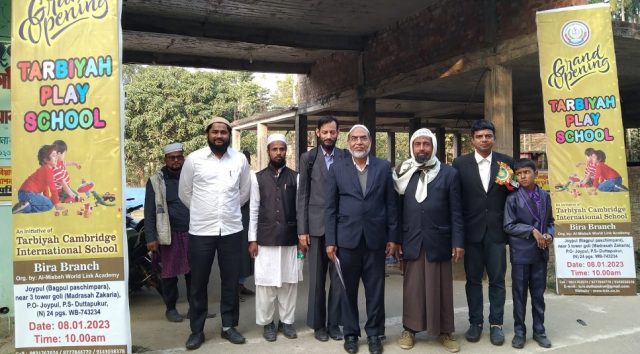
Reasons Behind an English Medium School
The idea of starting an English medium school had begun much before 2014 when Azizur Rahman used to visit foreign countries as part of his business tours.
He says, “I have been travelling abroad since I was 16. I used to get awe-struck by seeing progress made by foreign countries. On every return, I would shed silent tears at the wretched conditions of my fellow countrymen.”
According to him, it didn’t take him long to realize that the lack of education, more so the lack of modern English education, obstructed the country’s progress. He wanted to do something about it. He decided to set up an English medium school in his native town Barangar, Malda, West Bengal. However, the poverty of the local people was something that needed consideration.
Malda is thickly populated, with about 51% Muslims, but the literacy rate here is abysmally low. Most who attend schools often fail to make any headway in life due to the lack of quality education. The situation is worse among the poor, who comprise the working class in the bidi and plastic industries and migrants and labourers. Their financial condition doesn’t allow them to send their children to a school, much less an English medium school.
“An English medium school doesn’t seem viable in the area largely inhabited by economically weaker sections. Better you start a regional medium school for them,” Azizur Rahman remembers how his friends used to dissuade him from his plan of opening an English medium school.
Nevertheless, Azizur Rahman pushed ahead with his plan because he didn’t want to profit unreasonably. He wanted English education for the children coming from poor sections at any cost, so they are not discriminated against and get an equal chance to excel in life like the children of privileged ones in society.
An English Medium School, but With a Difference
While Azizur Rahman was determined to open a school with international education standards that would be accessible to all, especially the poor, he also wanted that school to be different from regular schools.
His vision was for a school that, besides modern education, would equally give importance to moral and ethical education so that students embody worldly success and the ethical practices of life in equal measure.
Driven by that noble desire, when he established the school, he aptly named itTarbiyah Cambridge International School (TCIS). Tarbiyah is an Arabic word that means nurturing or rearing. In a broader context, it refers to systematically teaching and upbringing children in accordance with Islamic values.
“In today’s world, neither parents give Tarbiyah to their children, nor do the children have time outside school hours to learn about it. I wanted to solve this problem with TCIS, where modern education and Tarbiyah were to be given side by side under one roof,” says Azizur Rahman.
Establishment and Growth of TCIS
Having done his homework properly, Azizur Rahman, with a determined will, established Tarbiyah Cambridge International School in 2014 adjacent to his Starling Silk Mills Pvt. Ltd in a sprawling six acres of land.
The school started with about 60 students up to class IV, and now it has more than 500 students up to class XII. Since Azizur Rahman’s name carries a lot of credibility in the area, parents don’t think twice about sending their children to his school. Every year the number of students is growing, and so is the school’s expansion.
As the need was felt to create more blocks and classrooms, the second leg of construction work for the school began in 2018, which got disrupted by COVID lockdowns, but it has now resumed on a war footing. “Since the demand is high, we are scaling up our infrastructure. We are set to increase our capacity to 1000 students very soon,” says Azizur Rahman proudly.
The school has seen exemplary growth in just about nine-year existence. Arguably, the persistent focus on quality by adhering to advance learning trends and techniques since the school’s inception is the reason behind its soaring popularity.
Notable Features of TCIS
Tarbiyah Cambridge International School (TCIS) is a school for the future which is dedicated to shaping the future of its students by providing them with the best education and moulding their personality in the right directions- morally, socially, and physiologically.
Azizur Rahman says, “By inculcating religious discipline, building characters, and helping intellectual growth, we aim at creating students into good human beings who are sensitive to the needs of others, respect fellow humans, and fulfil their duties towards society and the nation at large.”
He adds that the multi-faceted Tarbiyah programme at TCIS includes Tazweed & Understanding of the Quran and the Hifzul Quran program every Sunday. Furthermore, the school has collaborated with the Markaz Group of Kerala for moral value-based education.
TCSI is affiliated with CBSE and hasa balanced student-teacher ratio for effective learning. The teaching staff are highly experienced, well-trained, and competent to unravel the talent of every student and help them build on their strengths to excel.
Azizur Rahman says, “The teachers at our school work as a team and recognize their responsibility. They are not only adept in teaching academic curriculum but also wield impeccable values essential for inspiring students to pick up best practices in life.
Besides excellent teaching staff, the school is equipped with all the modern facilities such as fully digital classrooms, a well-stacked Library, Assembly Hall, Science Lab, Media Lab, separate boys’ and girls’ hostels.
An ample number of extracurricular activities, including martial arts, roller skating, cricket, football, tennis, volleyball, etc., add to students’ sporting skills and physical fitness.
To enhance leadership skills, TCIS has introduced 50+ ECC activities like quizzes, debates on contemporary topics, dramas on social issues, instant speeches, tongue twister competitions etc., which are performed publicly on the Annual Day of school.
Apart from that, daily students’ performance reports are being published digitally to monitor them very closely and take action according to the requirement.
Azizur Rahman says, “We have already introduced robotics and coding mathematics. We intend to introduce AI in our classrooms to create smart, responsive content for the personalised care of students.”
The hard work of the team has been bearing fruits consistently. For a recent example, the second batch of 10th standard has excelled in board exams. Students have obtained 85 to 97 percent marks in the 2022 board exam. In the coming days, more powerful academic performance is expected from the students.
Making TCIS a Brand
Azizur Rahman has a broader vision to spread the education model he envisages for the overall growth of students at a reasonable price.
“The idea is to develop TCIS into a credible brand and branch out into other areas, creating a sort of educational revolution keeping the underprivileged infocus.” Azizur Rahman says, “Our entire team is working very hard to fulfil the dreams of taking English medium education to rural India.”
According to him, the management has the vision to establish up to 200 branches, focusing on rural areas by 2024. Plans are already afoot to open the first 100 branches. We have already started 42branches at the junior level and one branch up to XII standards.
The main campus is already being developed swiftly to serve as the central branch, controlling and coordinating all other branches spread in the state and elsewhere.
Azizur Rahman says, “Ensuring technology-based quality and modern education in rural India is not only an attempt to take the TCIS brand to the needy sections of the society living the far-flung areas but also a sincere effort on our part to promote the concept of Digital India, which has been developed by the Govt. of India.”
Dream for a University
The sections of society that have been left behind in progress must get a fair chance to advance and acquire leadership roles in society. To that end, universities have a major role to play.
When it comes to West Bengal, the state has a significant minority population, but accordingly, there are not enough minority universities.
Azizur Rahman says, “Universities, in general, are in awful scarcity in our country. While in developed countries, for per 50 thousand population, there is about one university, in India, we don’t have a university even for 10 lakh people.”
Well aware of the situation in his state, Azizur Rahman nurtures a dream to establish a university that will open gates for minorities to excel in higher education. However, establishing a university is no child’s play. It requires enormous funds and infrastructures, as well as resources of other kinds.
Azizur Rahman says, “I have already consulted my industrialist friends who can contribute in this regard. Insha’Allah, taking everybody along, and with government assistance, we will be able to establish a university one day. But for now, our entire focus is to move ahead with TCIS. The university can wait.”
Azizur Rahman’sWorld View
Besides being an entrepreneur and educationist, Azizur Rahman is a thinker and has the brain of an intellectual. His insights into the history and contemporary world politics are discerning and impressive.
He says the world, including our beloved country India, is going through a tumultuous period where fascist and reactionary forces have dominated and successfully changed the political discourse to that of hate and bigotry.He shows his concerns about the growing trend of Islamophobia around the world.
Nevertheless, Azizur Rahman is hopeful that the time will change and people will get fed up with hate and eventually return to the path of peace, harmony, and brotherhood.
He says, “Education has a big role in healing the world. More than the present education system, the education tied to moral and ethical values we are advocating will serve the purpose.”
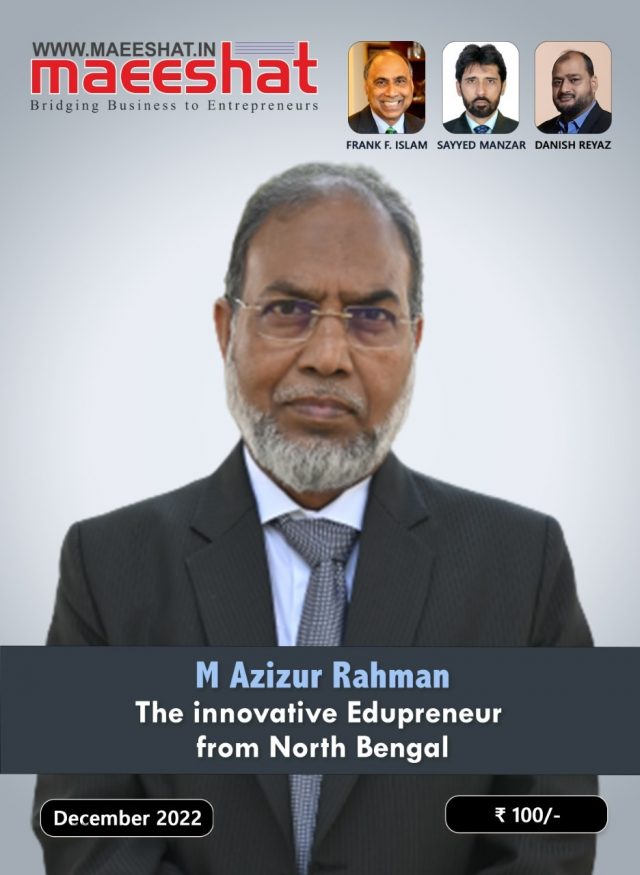
Maeeshat’s View
A man of many ideas, unbounded zeal, and tireless hard work, Azizur Rahman has given a new meaning to entrepreneurship and has also shown his mettle in community leadership.
On the one hand, his Starling Silk Mills employs hundreds of people; on the other, TCIS is doing stellar work to educate underprivileged children holistically. And considering the way TCIS expansion is taking place, we can say Azizur Rahman is a leader in the making for bigger things.
For Maseeshat Media, it is always heartening to see the emergence of new entrepreneurs and community leaders. Azizur Rahman’s endeavours are highly praiseworthy, especially because they are geared towards the causes of the disadvantages.
He has dispelled the notion that the poor and downtrodden are indifferent to change their fate through education. According to him, despite poverty, these people are aware of the importance of education. They want their children to be educated, but the community lacks the leadership to tap into their willingness.
He says, “Our community needs more leaders to come forward and shoulder the responsibility of establishing more and more educational institutions. One Tarbiyah Cambridge International School is not enough.”
Azizur Rahman considers himself a dreamer, even in an adverse situation. Had he not dreamed, nothing would have materialised. But he always backed his dreams with immense hard work and an undying passion for achieving them.
The dedicated crusader is on a constant mission to better the lives of others through meaningful and constructive changes. We have the highest regard for him.
Fittingly, when he signs off, he tells his favourite quote: “Zindagi tab banti hai jab aap khush hote hain. Lekin Zindagi tab behtareen banti hai jab koi aap ki wajah se khush hota hai.”

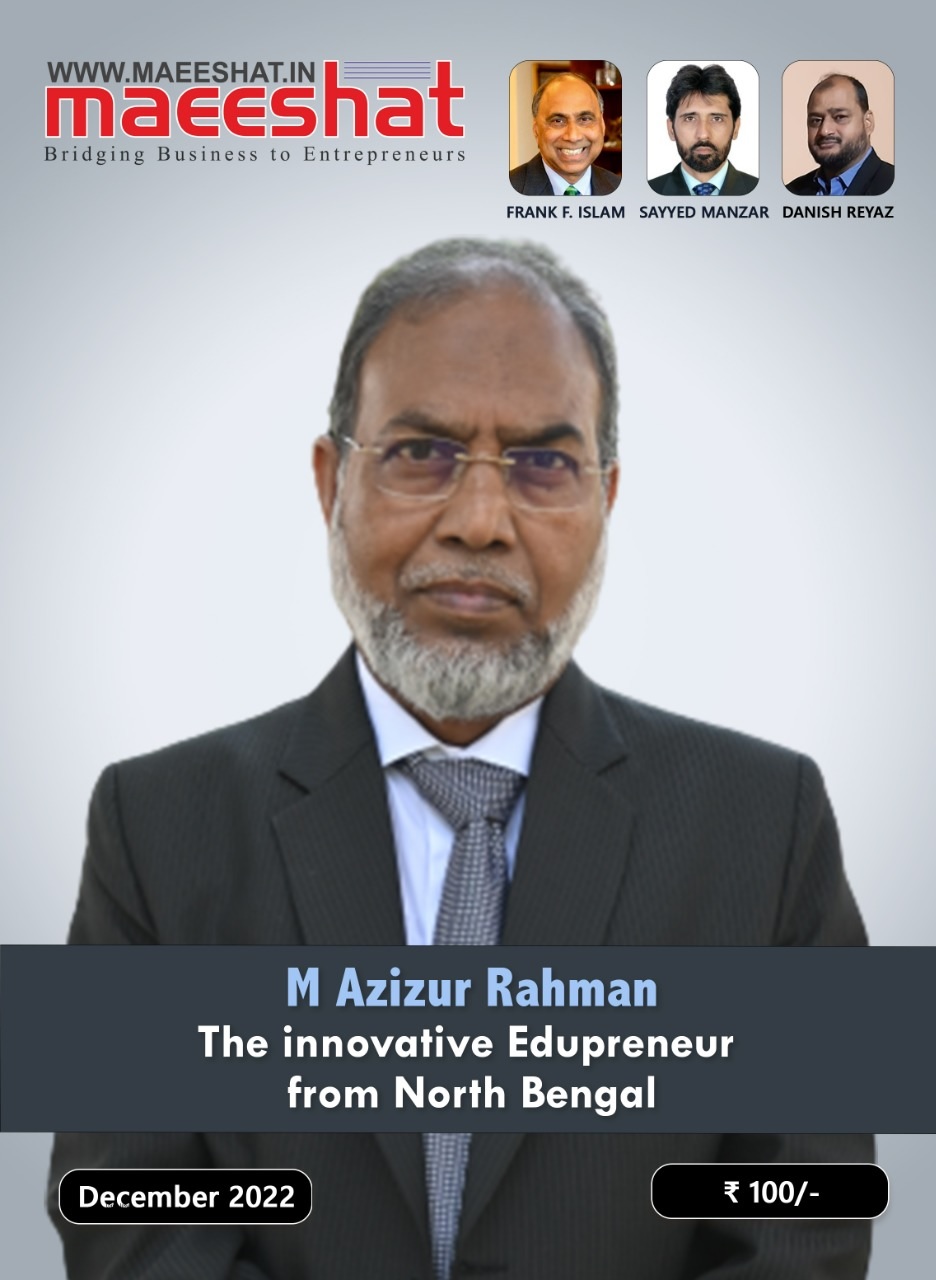

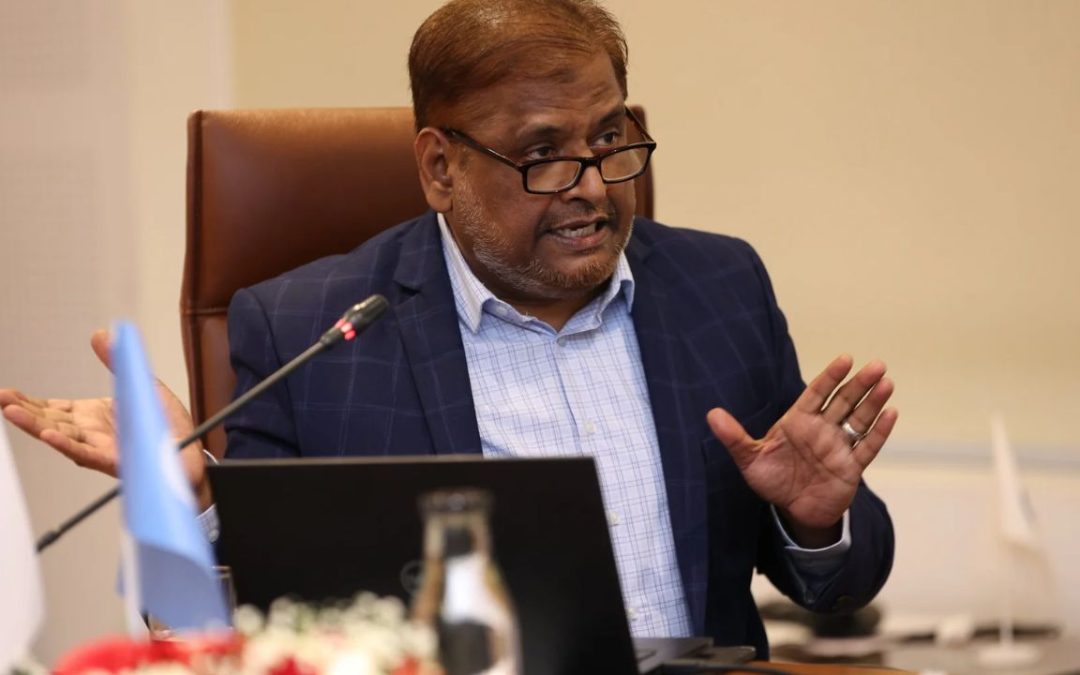

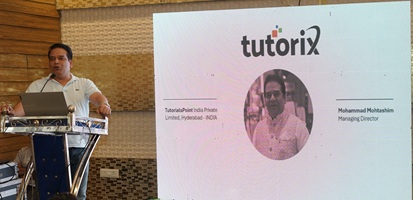
0 Comments